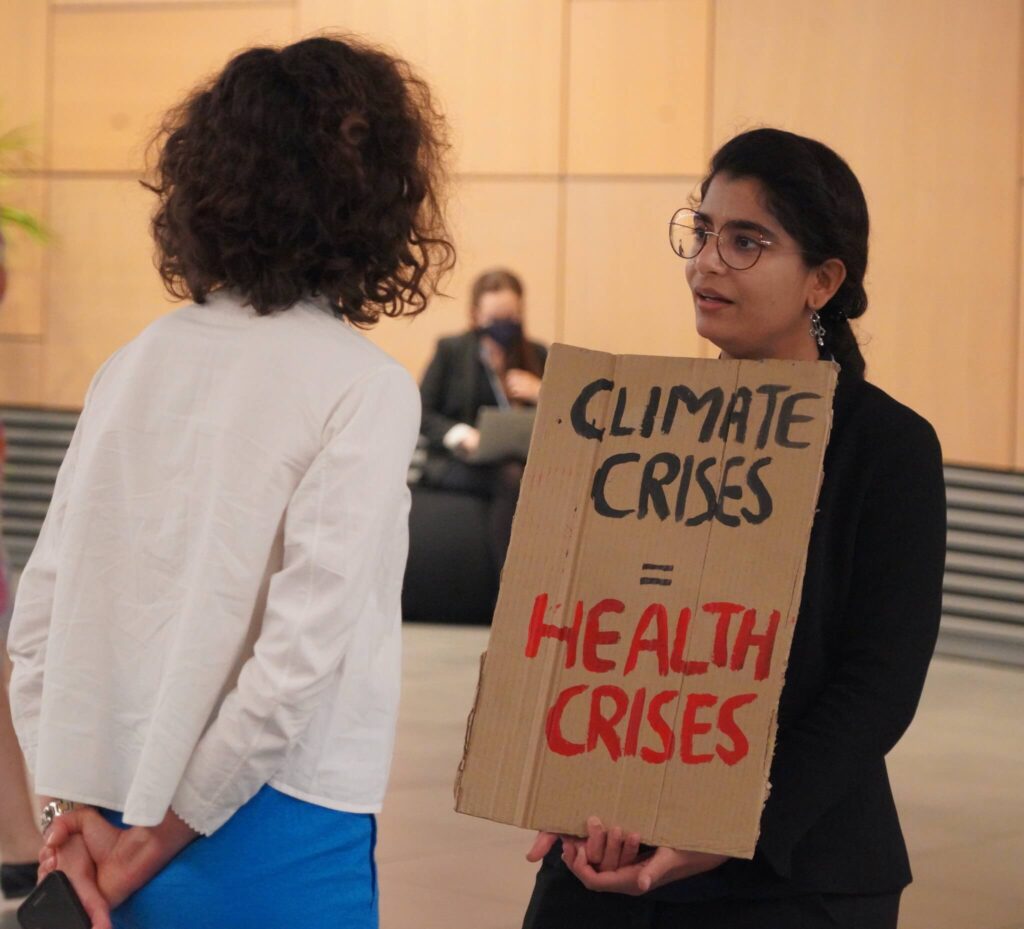Bonn, 14 June 2024:- As the UN Climate Change Conference (SB60) comes to a close in Bonn without significant progress, and the G7 kicks off in Italy, the Global Climate and Health Alliance called on developed countries to rapidly reduce emissions and to deliver on climate finance – such as the reallocation of fossil fuel subsidies to climate finance – in order to protect people from the worst impacts of climate change. Meanwhile, tens of people migrating from Sudan to Egypt have been killed by extreme heat in the past days, and hundreds in India since March.
Progress stalled in Bonn, with some countries deliberately avoiding discussions on ending fossil fuel use, undermining progress made at COP28, despite efforts by others to advance action. With just six months until a decision must be reached during COP29 in Baku, governments also failed to make substantial headway on agreeing a new goal for climate finance, with major questions of quantity, source, allocation (to mitigation, adaptation, or also loss and damage) and nature of funding (e.g., grants or loans) left unresolved. The COP29 presidency doubled back on an earlier proposal to tax fossil fuels as a way to raise additional funding to assist countries most impacted by climate change (albeit with fossil-fuel producing nations as fund shareholders), with Azerbaijan’s chief negotiator later stating that “we cannot single out any particular part of the industry [from other industries]”. Yet fossil fuel companies have made record profits in recent years, while health systems buckle under the growing strain of the impacts of heatwaves, storms, and disease on people’s health.
“During this month’s Bonn Climate Conference, governments could have accelerated a response to the “transition away from fossil fuels” signaled during COP28, but instead spent two weeks kicking the can down the road without agreeing on any decision on mitigation at all, with some countries directly obstructing useful discourse to protect human health and wellbeing”, said Dr Jeni Miller, Executive Director of the Global Climate and Health Alliance. “With COP29 just months away, developed countries, including the G7, must act to protect people’s health from the climate crisis, by rapidly reducing emissions and delivering on climate finance, including shifting fossil fuel subsidies to ensure finance to support all countries so they can adapt, respond and transition in the climate era.”
“While we wait for governments to get their act together, communities in every country around the world are paying the price with their health, their lives, their children’s futures, with low income, developing countries are suffering the most”, said Miller. “Meanwhile, governments continue to spend trillions subsidizing fossil fuels – there is enough finance, it’s just being spent immorally, and in the most harmful places.”
During SB 60, negotiators from climate-vulnerable nations spoke compellingly about the health costs of climate change during their interventions – including mental health, drug and alcohol problems after displacement and relocation, malaria, sexual and reproductive health, fatalities from floods and landslides, and damage to healthcare infrastructure – as well as the need for intersectoral collaboration with ministries of health to address this.
Kenya on behalf of African countries underscored how repayment of debt is costing more than healthcare and education, and the need for climate finance arrangements to guard against perpetuating these cycles. But progress made has been wholly insufficient to address these challenges.
“Climate finance that is based heavily on loans exacerbates cycles of debt, poverty and ill-health”, explained Jess Beagley, Global Climate and Health Alliance Policy Lead.
One area where progress was made was on agreeing a way forward to identify metrics for adaptation, including the extent to which adaptation measures are serving human health and well-being. In addition, high emitting countries including Australia and the EU spoke of the opportunities of health co-benefits offered by just transitions.
“Over the next six months countries will be updating their Nationally Determined Contributions, the NDCs, which are their national climate plans and commitments as part of the Paris Agreement”, said Beagley. “This is a key opportunity for national governments to step up and protect their populations, by developing credible plans for adapting to climate change in ways that protect health, across sectors; reducing air pollution by phasing out polluting use of fossil fuels including oil, gas, and coal; reflecting the health costs and consequences of inaction in their financial calculus for progress on climate change; and committing to delivering a better future for their people by bringing, health, environment, energy, education, transportation, water, agriculture, and other sectors to work together for holistic, long-term, transformative solutions.”
“Developed countries have a responsibility to ramp up their emission reductions in their new NDCs in line with a rapid trajectory to phase out fossil fuels. We urge health ministries to be at the NDC decision making tables, to ensure decisions are being made with their citizens’ health in mind”, said Beagley. “For developing countries, the NDCs are also an opportunity to clearly articulate what they can do within their own resources, and what they are ready, willing, and able to do if the countries and companies most responsible for climate change provide the funding and resources needed”, Beagley concluded.
Contact:
Dave Walsh, Communications Advisor, Global Climate and Health Alliance, [email protected], +34 691 826 764
About GCHA
The Global Climate and Health Alliance is a consortium of more than 160 health professional and health civil society organizations and networks from around the world addressing climate change. We are united by a shared vision of an equitable, sustainable future, in which the health impacts of climate change are minimized, and the health co-benefits of climate change mitigation are maximised.
Find out more: https://climateandhealthalliance.org/about/


